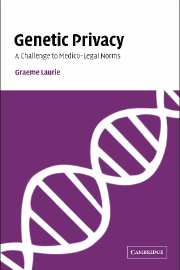Book contents
- Frontmatter
- Contents
- Preface
- Table of cases
- Table of legislation
- International instruments
- Miscellaneous documents
- 1 Health care, patient rights and privacy
- 2 Privacy: anti-social concept or fundamental right?
- 3 Human genetics and genetic privacy
- 4 Autonomy, confidentiality and privacy
- 5 Privacy and the public interest
- 6 Privacy and property?
- Index
2 - Privacy: anti-social concept or fundamental right?
Published online by Cambridge University Press: 25 June 2009
- Frontmatter
- Contents
- Preface
- Table of cases
- Table of legislation
- International instruments
- Miscellaneous documents
- 1 Health care, patient rights and privacy
- 2 Privacy: anti-social concept or fundamental right?
- 3 Human genetics and genetic privacy
- 4 Autonomy, confidentiality and privacy
- 5 Privacy and the public interest
- 6 Privacy and property?
- Index
Summary
The public/private distinction
The distinction between public and private spheres of life has increased in importance in Western culture during the last few centuries along with the growing emphasis on individualism. Its importance was concretised in American legal and political discourse in the nineteenth century. As Horowitz has noted, ‘One of the central goals of nineteenth century legal thought was to create a clear separation between constitutional, criminal, and regulatory law – public law – and the law of private transactions – torts, contracts, property, and commercial law.’
At much the same time in England, John Stuart Mill produced On Liberty, published in 1859, in which he defended the freedoms of the individual against social and political control: ‘There is a limit to the legitimate interference of collective opinion with individual independence; and to find that limit, and maintain it against encroachment, is as indispensable to a good condition of human affairs as protection against political despotism.’
As this suggests, the public/private distinction ensures that the legitimacy of interference with individual action is continually under scrutiny. This implies that individuals and individual action are of considerable importance in at least one sphere – the private sphere – and further, that it is a good thing that the boundary between the two spheres is maintained. Two points arise from this. First, it is not to be inferred that placing conduct in the private sphere automatically precludes regulation of that conduct, indeed there might be strong and valid reasons to impose constraints.
- Type
- Chapter
- Information
- Genetic PrivacyA Challenge to Medico-Legal Norms, pp. 28 - 85Publisher: Cambridge University PressPrint publication year: 2002



